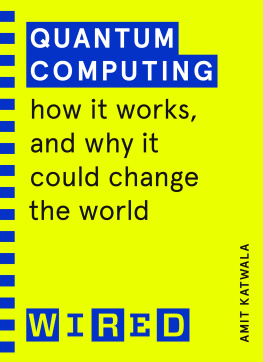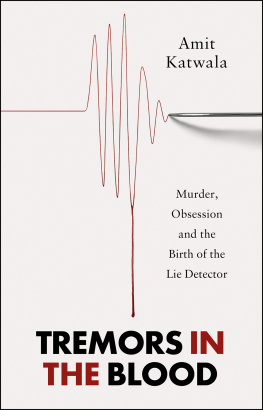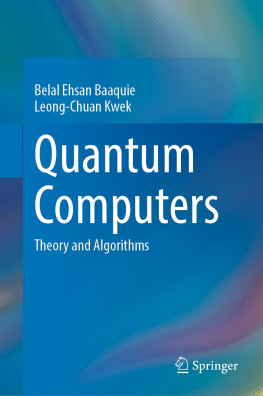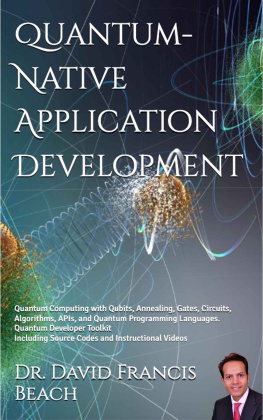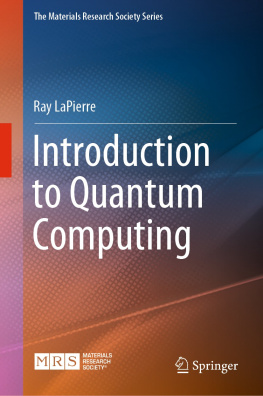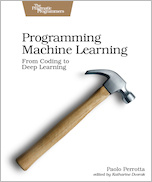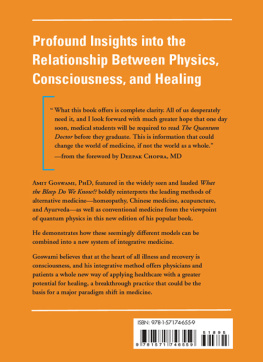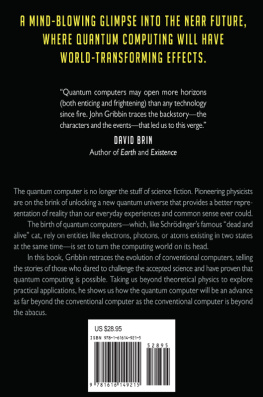
Amit Katwala
QUANTUM COMPUTING
How It Works, and Why It Could Change the World

Contents
About the Author
WIRED is the worlds most authoritative and respected publication reporting on the emerging trends, ideas and technologies shaping our world. Our mission is to tell the stories of the people who are driving this change and to understand its impact on business, society and individuals. WIRED has become synonymous with informed and intelligent analysis of these transformational forces and the significance of them for industries and individuals and is a consistently reliable predictor of change.
Amit Katwala is a senior editor at WIRED UK.
Introduction
Summit, the IBM supercomputer at Oak Ridge National Laboratory in Tennessee, weighs three times more than a blue whale and fills the space of two tennis courts. It has 219 kilometres of cabling and can perform more than three quintillion calculations per second. In June 2019, it was crowned the worlds fastest supercomputer for the second year in a row.
But around the same time as it claimed that prize, Summit was being secretly outdone not by Sierra, its closest US rival, nor by Fugaku, a Japanese project touted to overtake it when it comes fully online in 2021. Instead, this vast machine was quietly beaten by a tiny chip no bigger than a thumbnail, in a small private research lab near the beach in Santa Barbara, California.
The chip, called Sycamore, was developed by researchers at the search giant Google. It forms the central part of a quantum computer a new, fundamentally different type of device that works according to the laws of quantum physics.
Quantum computers have vast potential. They could eventually revolutionise everything from artificial intelligence to the development of new drugs. A working quantum computer could help create powerful new materials, turbocharge the fight against climate change and completely upend the cryptography that keeps our secrets safe. It would, as Discover magazine put it in the early days of research, be less a machine than a force of nature.
If their potential can be fully realised, these devices wont simply be more powerful versions of our existing computers. They work in a completely different way, which could enable them to do seemingly impossible things. Because their strengths are so alien to the way most of us perceive the universe, it can be difficult to explain them without resorting to slightly fuzzy analogies. But effectively, quantum computers could unlock a new set of abilities based on the new, deeper understanding of the universe that physicists have developed over the last century.
Imagine youre playing chess and the rules are changed in your favour, enabling your rook an expanded range of moves, write quantum scientist Michael Nielsen and software engineer Andy Matuschak, in an analogy that attempts to make something astonishingly complex comprehensible to the average person. That extra flexibility might enable you to achieve checkmate much faster because you can get to new positions much more quickly.
In certain situations, quantum computers could allow us to do things that are impossible right now, even with the power of a million supercomputers. Believe the hype, and were on the verge of a new technological era, in which quantum computers will help us create more efficient travel routes, and crunch complex sums in scientific experiments. Theyll potentially change the way banks analyse risk, and allow chemists and biologists to create detailed simulations of the natural world to develop new, more efficient materials and processes. This is one of the biggest technology jumps ever, in history, says William Hurley (known as Whurley), tech entrepreneur and founder of Strangeworks, which is working to make quantum computing accessible to all. Computing will change more in the next ten years than it has in the last hundred.
Until recently, there were doubts over whether quantum computers would ever actually work. Even now, some are still sceptical whether a practically useful version of a quantum computer will ever actually exist. Theyre incredibly difficult to build, presenting huge engineering, manufacturing and mathematical challenges. But, over the last twenty years, some of the worlds biggest companies Google, Amazon, Microsoft, IBM, Intel and others have been racing to build working, practically useful quantum devices.
In the summer of 2019, a team of researchers at Google, who had spent the better part of a decade trying to build quantum computers, reached a milestone known as quantum supremacy. The term, coined by the physicist John Preskill, describes the point at which a quantum computer can do something that the worlds best classical computer could never do.
This seminal moment in the history of computing arrived on 13 June, when Googles Sycamore chip chilled to a temperature colder than outer space performed a series of complex calculations that would have taken the Summit supercomputer 10,000 years, in just 3 minutes and 20 seconds. It was a landmark moment. This is a wonderful achievement. The engineering here is just phenomenal, Peter Knight, a physicist at Imperial College London, told New Scientist when the research paper was published a few months later. It shows that quantum computing is really hard but not impossible. It is a stepping stone toward a big dream.
It marked a fundamental moment: when quantum computing went from being neat theory to genuine possibility. Since Googles announcement, millions of dollars in funding have poured into the field from governments and venture capitalists.
Inside Google, they compare the achievement to the first flight by the Wright brothers at Kitty Hawk, which marked the birth of the aviation industry. There are people that literally think that the thing we did or the next steps are not possible, says Google quantum hardware engineer Tony Megrant, who helped design and build the Sycamore chip. Others are less convinced. By the time the research was officially published, some of Googles rivals in the quantum race particularly IBM had started to cast some doubt on whether the Sycamore chip was actually as far ahead of Summit as the search giant had claimed. They argued that the task Google set was too narrow and specific to count as quantum supremacy.
But regardless of the technicalities, quantum supremacy is a huge technical achievement, and one that could mark a new era of technological process: the dawn of the Quantum Age. The real race, however, has only just begun. Weve been working on the hardware aspect of this for ten years, so I always picture in my head the starting line of a race being at the top of a mountain, Megrant says. We had to get up here to start the race.
This book will tell the story of that race, and explore the myriad ways in which quantum computers could reshape the worlds of finance, medicine and politics, and further our understanding of the universe. But well start with the basics.
1
What is quantum computing?
Until very recently, every computer in the world from the room-sized codebreakers of the 1940s to the tiny processor in your smartphone worked in essentially the same way. The birth of silicon chips and semiconductors has driven unbelievable progress, but the underlying principles governing todays high-tech devices are exactly the same ones that Alan Turing and his colleagues worked with at Bletchley Park, the British codebreaking centre which gave rise to some of the first classical computers. They are the same ones that power everything that came in between, to the extent that even your creaking old desktop PC can theoretically do anything the Summit supercomputer can do (if you give it enough time and memory).
Next page
